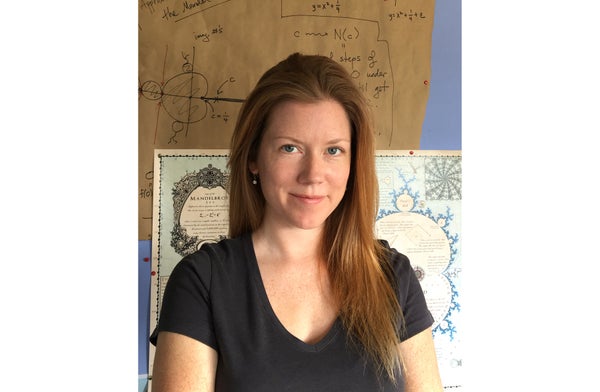This article was published in Scientific American’s former blog network and reflects the views of the author, not necessarily those of Scientific American
On this episode of our podcast My Favorite Theorem, my cohost Kevin Knudson and I were happy to invite Holly Krieger to the show. She is a mathematician at the University of Cambridge and has appeared several times on the mathematics YouTube channel Numberphile. You can listen to the episode here or at kpknudson.com, where there is also a transcript.
Dr. Krieger chose the Brouwer fixed-point theorem as her favorite theorem, which means for the first time on the show, we had a theorem repeat! Francis Su also chose Brouwer's fixed-point theorem when we talked to him for an episode that aired in June. Several of our guests have expressed worries about repeating theorems, but Kevin and I were actually crossing our fingers that it would happen at some point. There are some good theorems there that deserve a lot of love, and we wanted a chance to look at the same theorem in different ways with different guests. Dr. Su’s episode hadn’t aired yet when we recorded this episode, and we decided not to break the news to Dr. Krieger until after we finished recording the episode. Thanks, Dr. Krieger, for being a good sport after we told you, and thanks to Brouwer's fixed-point theorem for being so nice our guests chose it twice!
On supporting science journalism
If you're enjoying this article, consider supporting our award-winning journalism by subscribing. By purchasing a subscription you are helping to ensure the future of impactful stories about the discoveries and ideas shaping our world today.
Brouwer's fixed-point theorem hasn’t changed much since we talked to Dr. Su, so I’ll share my description from the show notes for his episode again:
This theorem states that given a blob (more rigorously, a connected region in the plane or in higher-dimensional space with no holes, but “blob” works pretty well), if you look at a function from the blob to itself, there is always some point that doesn’t move. An example of what we mean by “function from the blob to itself” would be stirring or swirling tea in a mug. Every point in the mug moves somewhere else in the mug, so we could write down what happens by saying that point x moved to point y, point y moved to point z, and so on. Brouwer’s fixed point theorem says that if you do stir the tea in your mug, there must be at least one molecule of tea that ends up in the same place it started in. For more information on the theorem, you can start with Dr. Su’s page explaining it or Tai-Danae Bradley’s video about it for the PBS Infinite Series channel.
Dr. Krieger brought up some fascinating historical tidbits about the fixed-point theorem. L. E. J. Brouwer, for whom the theorem was named, founded a movement in mathematics called intuitionism. Broadly speaking, this philosophy holds that mathematics must be constructed to be valid. To an intuitionist, it would not be enough for me to tell you my proof showed that there must be some number with a particular property; they would want me to produce the number itself. The philosophy limits the kinds of arguments that are considered legitimate to use in proofs. It was in part a reaction to the mathematics of Georg Cantor, whose highly abstract methods were making waves in mathematics at the time. Ironically, Brouwer’s proof of his fixed-point theorem is not constructive. The theorem can tell you that a fixed point for a particular map exists, but it doesn’t help you find one.
In each episode of the podcast, we ask our guest to pair their theorem with food, beverage, art, music, or other delight in life. Dr. Krieger went with a Manhattan cocktail. You’ll have to listen to the episode to learn why it’s the perfect accompaniment to Brouwer’s fixed-point theorem. (If you want a mathematician to make you a Manhattan, I'd suggest asking Dr. Krieger or another dynamicist, as I explain in this post about mathematicians and household chores.)
You can find Holly Krieger at her website and on Twitter. I am particularly fond of her Numberphile videos about the Mandelbrot set and filled Julia sets. You can find more information about the mathematicians and theorems featured in this podcast, along with other delightful mathematical treats, at kpknudson.com and here at Roots of Unity. A transcript is available here. You can subscribe to and review the podcast on iTunes and other podcast delivery systems. We love to hear from our listeners, so please drop us a line at myfavoritetheorem@gmail.com. Kevin Knudson’s handle on Twitter is @niveknosdunk, and mine is @evelynjlamb. The show itself also has a Twitter feed: @myfavethm and a Facebook page. Join us next time to learn another fascinating piece of mathematics.
Previously on My Favorite Theorem:
Episode 0: Your hosts' favorite theorems Episode 1: Amie Wilkinson’s favorite theorem Episode 2: Dave Richeson's favorite theorem Episode 3: Emille Davie Lawrence's favorite theorem Episode 4: Jordan Ellenberg's favorite theorem Episode 5: Dusa McDuff's favorite theorem Episode 6: Eriko Hironaka's favorite theorem Episode 7: Henry Fowler's favorite theorem Episode 8: Justin Curry's favorite theorem Episode 9: Ami Radunskaya's favorite theorem Episode 10: Mohamed Omar's favorite theorem Episode 11: Jeanne Clelland's favorite theorem Episode 12: Candice Price's favorite theorem Episode 13: Patrick Honner's favorite theorem Episode 14: Laura Taalman's favorite theorem Episode 15: Federico Ardila's favorite theorem Episode 16: Jayadev Athreya's favorite theorem Episode 17: Nalini Joshi's favorite theorem Episode 18: John Urschel's favorite theorem Episode 19: Emily Riehl's favorite theorem Episode 20: Francis Su's favorite theorem Episode 21: Jana Rordiguez Hertz's favorite theorem Episode 22: Ken Ribet's favorite theorem Episode 23: Ingrid Daubechies's favorite theorem Episode 24: Vidit Nanda's favorite theorem
